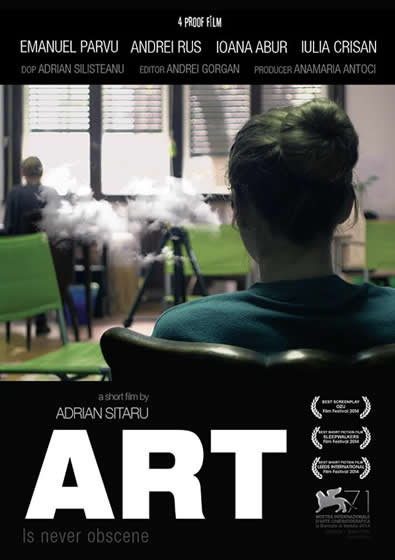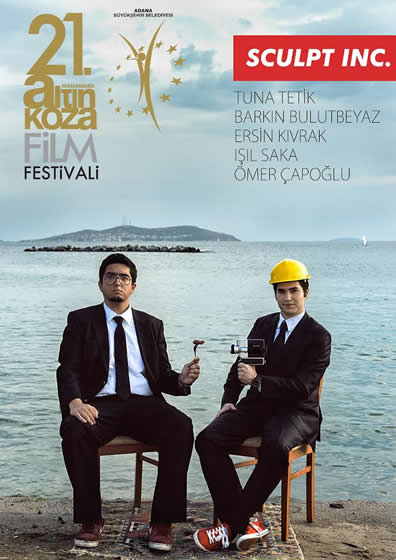 This year marks the tenth anniversary of the South East European Film Festival, and the opening night celebrates Romanian cinema, a country whose films have been much-lauded over the past decade as part of a Romanian New Wave. Often tackling harsh subjects with unsparing realism, usually in long takes, these films have helped bring a greater critical spotlight to South East Europe. This movement is reflected not only in Romanian features, but in the short films as well: Fish Tank employs one long take to tell the story of strained familial relationships, and the thought-provoking film, Art, daringly toes a fine line between exploitation and artistic expression. The documentary short, Cemetery 35, considers the loss of cinema’s past, visiting a former Romanian film storage facility that has fallen to ruin. These three films help represent one of SEEFest’s missions: to showcase emerging filmmaking talent, and to illuminate the region’s filmic past, and that mission extends beyond just Romania.
This year marks the tenth anniversary of the South East European Film Festival, and the opening night celebrates Romanian cinema, a country whose films have been much-lauded over the past decade as part of a Romanian New Wave. Often tackling harsh subjects with unsparing realism, usually in long takes, these films have helped bring a greater critical spotlight to South East Europe. This movement is reflected not only in Romanian features, but in the short films as well: Fish Tank employs one long take to tell the story of strained familial relationships, and the thought-provoking film, Art, daringly toes a fine line between exploitation and artistic expression. The documentary short, Cemetery 35, considers the loss of cinema’s past, visiting a former Romanian film storage facility that has fallen to ruin. These three films help represent one of SEEFest’s missions: to showcase emerging filmmaking talent, and to illuminate the region’s filmic past, and that mission extends beyond just Romania.
Throughout the region, filmmakers are expressing lives and culture in their countries with bold cinematic voices. The Croatian short, By Chance, is a thoughtful tale of two young ex-lovers sharing their histories, while Dead End, from Cyprus, uses sharp social commentary and pitch-black humor to examine an elderly couple’s rift in communication. Hungary’s The Penguin Construction and Turkey’s Yesterday Today Tomorrow both find deadpan humor in their love (or at least love-ish) stories of different generations, and A Soccer Game Journal offers a cutting take on Turkish society. Both Slovenia’s Kresnik: The Lore of Fire and Serbia’s Nine Days serve as bridges between young and old. The former enlists young actors to modernize early Slavik mythology, and the latter tackles the generation gap head on, as a teenager must care for his grandmother for the titular amount of time. Fittingly, the short nods to the region’s cinematic heritage by casting Eva Ras as the  grandmother, an actress who made her mark in Dušan Makavejev’s Yugoslav Black Wave films of the 1960s.
grandmother, an actress who made her mark in Dušan Makavejev’s Yugoslav Black Wave films of the 1960s.
While looking to the past is crucial for every culture, the Greek documentary, Off-History, uses a piece of architecture to ruminate on the problems that come from focusing on past glories. Considering architecture in a more humorous light is Turkey’s Sculpt, Inc., and culture reflected through art is also the subject of Nikola Mihov, a documentary about the Bulgarian photographer. Just as Mihov’s photographs capture urgent socio-political issues, the documentary shorts illuminate these issues by offering glimpses into the lives of peoples throughout the region, with Georgia’s Once Upon Another Time and the Serbia/Hungary/Malta co-production Resumption both showcasing families facing uncertain futures. Along with these films, the Greek documentary, Busking in Thessaloniki, uses vibrant music to spotlight economic struggles and art.
While both the documentary and live-action shorts are grounded in the realities of the region, the animation format allows for more abstract ways to reflect the region. For the first time ever, SEEFest is pleased to present a showcase of animated shorts from South East European filmmakers. Ranging from clay-mation to CGI to stop-motion to drawn-entirely-on-a-smartphone, These three films help represent one of SEEFest’s missions: to showcase emerging filmmaking talent, and to illuminate the region’s filmic past, and that mission now extends to 18 countries whose cultural and cinematic diversity the festival covers.

